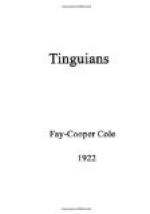Throughout the rest of the day many spirits visit the mediums, and at such a time Kakalonan is sure to appear to give friendly advice. The final act is to set the spirit raft afloat on the stream.
CHAPTER VI
SOCIAL ORGANIZATION. GOVERNMENT. THE VILLAGE
The village is the social unit within which there are no clans, no political, or other divisions. The Tinguian are familiar with the Igorot town, made up of several ato [168] but there is no indication that they have ever had such an institution.
The head of the village is known as lakay. He is usually a man past middle age whose wealth and superior knowledge have given him the confidence of his people. He is chosen by the older men of the village, and holds his position for life unless he is removed for cause. It is possible that, at his death, his son may succeed him, but this is by no means certain.
The lakay is supposed to be well versed in the customs of the ancestors, and all matters of dispute or questions of policy are brought to him. If the case is one of special importance he will summon the other old men, who will deliberate and decide the question at issue. They have no means of enforcing their decisions other than the force of public opinion, but since an offender is ostracised, until he has met the conditions imposed by the elders, their authority is actually very great. Should a lakay deal unjustly with the people, or attempt to alter long established customs, he would be removed from office and another be selected in his stead. No salary or fees are connected with this office, the holder receiving his reward solely through the esteem in which he is held by his people.
In former times two or three villages would occasionally unite to form a loose union, the better to resist a powerful enemy, but with the coming of more peaceful times such beginnings of confederacies have vanished. During the Spanish regime attempts were made to organize the pagan communities and to give titles to their officers, but these efforts met with little success. Under American rule local self government, accompanied by several elective offices, has been established in many towns. The contest for office and government recognition of the officials is tending to break down the old system and to concentrate the power in the presidente or mayor.
It is probable that the early Tinguian settlement consisted of one or more closely related groups. Even to-day the family ties are so strong that it was found possible, in compiling the genealogical tables, to trace back the family history five or six generations.
These families are not distinguished by any totems, guardian spirits, or stories of supernatural origin, but the right to conduct the more important ceremonies is hereditary. Descent is traced through both the male and female lines, and inheritance is likewise through both sexes. There are no distinguishing terms for relations on the father’s or mother’s side, nor are there other traces of matriarchal institutions.




